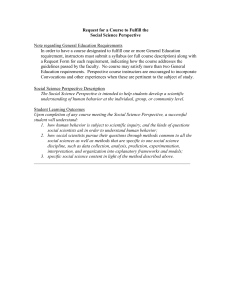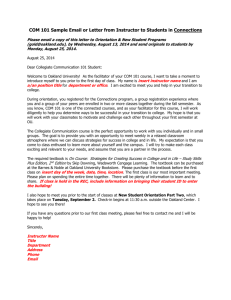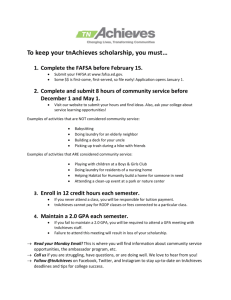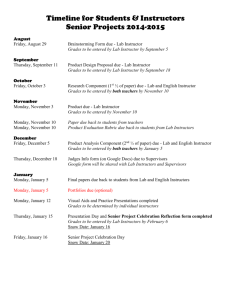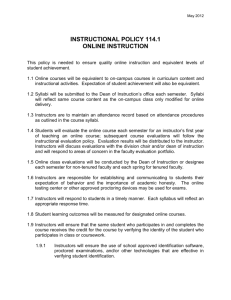2014-2015 Instructor Expectations
advertisement
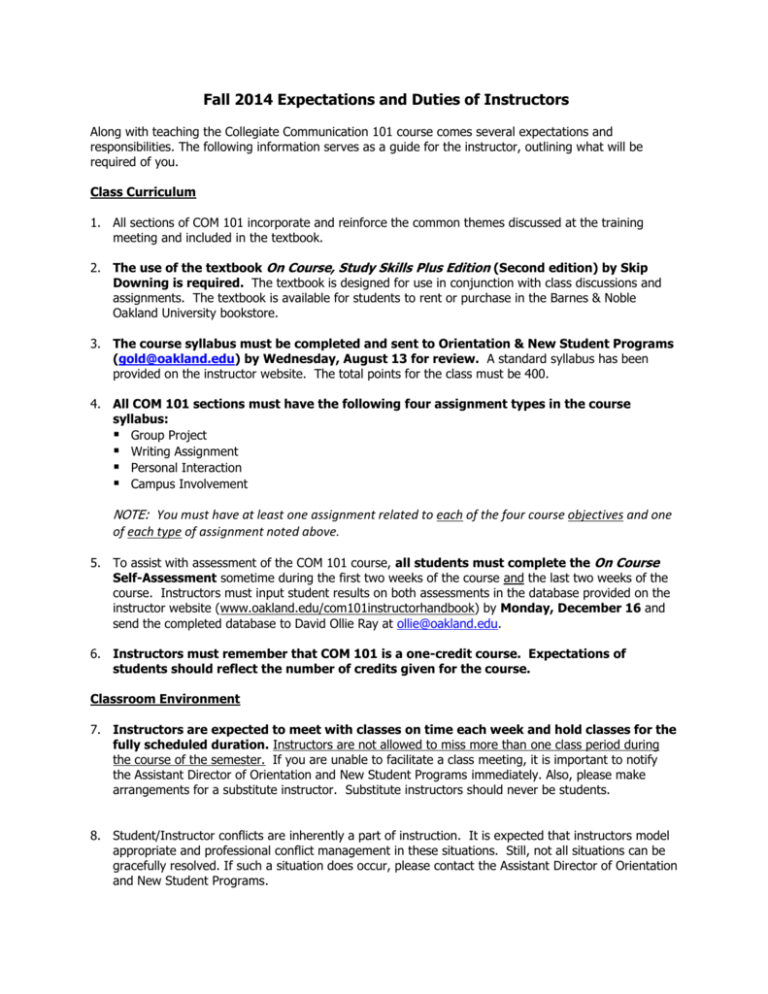
Fall 2014 Expectations and Duties of Instructors Along with teaching the Collegiate Communication 101 course comes several expectations and responsibilities. The following information serves as a guide for the instructor, outlining what will be required of you. Class Curriculum 1. All sections of COM 101 incorporate and reinforce the common themes discussed at the training meeting and included in the textbook. 2. The use of the textbook On Course, Study Skills Plus Edition (Second edition) by Skip Downing is required. The textbook is designed for use in conjunction with class discussions and assignments. The textbook is available for students to rent or purchase in the Barnes & Noble Oakland University bookstore. 3. The course syllabus must be completed and sent to Orientation & New Student Programs (gold@oakland.edu) by Wednesday, August 13 for review. A standard syllabus has been provided on the instructor website. The total points for the class must be 400. 4. All COM 101 sections must have the following four assignment types in the course syllabus: Group Project Writing Assignment Personal Interaction Campus Involvement NOTE: You must have at least one assignment related to each of the four course objectives and one of each type of assignment noted above. 5. To assist with assessment of the COM 101 course, all students must complete the On Course Self-Assessment sometime during the first two weeks of the course and the last two weeks of the course. Instructors must input student results on both assessments in the database provided on the instructor website (www.oakland.edu/com101instructorhandbook) by Monday, December 16 and send the completed database to David Ollie Ray at ollie@oakland.edu. 6. Instructors must remember that COM 101 is a one-credit course. Expectations of students should reflect the number of credits given for the course. Classroom Environment 7. Instructors are expected to meet with classes on time each week and hold classes for the fully scheduled duration. Instructors are not allowed to miss more than one class period during the course of the semester. If you are unable to facilitate a class meeting, it is important to notify the Assistant Director of Orientation and New Student Programs immediately. Also, please make arrangements for a substitute instructor. Substitute instructors should never be students. 8. Student/Instructor conflicts are inherently a part of instruction. It is expected that instructors model appropriate and professional conflict management in these situations. Still, not all situations can be gracefully resolved. If such a situation does occur, please contact the Assistant Director of Orientation and New Student Programs. 9. You are in a position of power in relation to students. Do not establish relationships which can compromise your role as instructor. Please review the university policies on Sexual Harassment. Language which can be considered demeaning or intimidating (such as honey or dear) may violate this policy and should be avoided. 10. Collegiate Communication 101 is intended to bridge a new student’s previous experience with the university environment. The classroom experience should provide students many opportunities to learn and share from one another. Assisting students in developing friendships and study groups with other students in the course is essential. 11. Instructor participation in class discussions, activities and projects is expected. This course is designed to be interactive; keep lectures and guest speakers to a minimum. 12. Be available for your students. If a student misses more than one class meeting, please contact them to discuss the situation. Please make it clear to students in your section that you are available to them if they are experiencing academic or personal difficulties. Reinforce this message throughout the twelve weeks. You are encouraged to meet with students individually at least one time during the twelve weeks. 13. In order to help the students become more connected to the university, it is important for the instructors to keep up to date on campus events and share this information with the students. 14. Instructors are asked to regularly communicate with students using the OU email system. Suggested communications may include feedback on student questions asked in class, motivational poems, and reminders about registration or payment deadlines and campus events. 15. Keep the Assistant Director of Orientation and New Student Programs aware of any problems you are having in your class. When in doubt please call. Grading 16. Instructors are expected to return all graded student assignments at the next class meeting. 17. The Family Educational Rights and Privacy Act (FERPA) protects all students. This means that grades may not be posted, papers with grades must be handed out to the specific student, and students who are picking up papers must be handed only their work. You cannot put papers in a box for students to go through. Furthermore, the law does not allow you to discuss the student’s grade with a parent, legal guardian or anyone else outside the institution that in the normal course of business would not have access to the student’s academic file. An exception can be made if the student grants written permission to allow access. 18. Students will receive a numerical grade for COM 101. 19. It is important to have a clearly defined grading policy included in your course syllabus. Students tend to rise to the expectations set for them. Please make them very clear. Three absences is equivalent to 25% of class time missed. This would not be acceptable in other college courses and should not be acceptable for this course either. Students are not allowed to miss class more than twice or they will automatically fail the course. 20. Instructors are required to notify students by mid-term of their progress in the course to date for all 100-200 level classes. There is a University policy requiring instructors to submit information to students in danger of failing through the SAIL system by Friday, October 17. 21. Final grades must be submitted through the SAIL system by the deadline established by the Office of the Registrar, which is Monday, December 15 22. Keep grade records for at least a year after the class is over in order to discuss them with interested students. Students have every right to a discussion of their grades both during and after the class is completed. Though teacher/student grade discussions are sometimes difficult, it is nonetheless important to schedule such meetings without delay. This should be a private “face to face” discussion. If the student wishes to pursue the matter further, he or she should meet with the Assistant Director of Orientation and New Student Programs, who will act as the liaison between the student, instructor, and Beth Talbert as necessary. Other Tasks 23. Each instructor is responsible for sending out an email and/or letter to each of the enrolled students prior to the first week of class. Email a copy of your letter to Orientation and New Student Programs (gold@oakland.edu) by Wednesday, August 13. A sample letter is included on the instructor website. Student information can be located in SAIL. 24. All instructors are required to distribute course evaluation information to students during the second to last week of the course. 25. Please make it your responsibility to do one or more of the following to find out about school closings. Listen to radio stations WJR (760 am ) or WWJ (950 am) Call the University hotline at (248) 370-2000 Or look for the announcement on the University website: www.oakland.edu 26. Our faculty and student body reflect the diverse community which supports our University. You should be especially mindful of respecting cultural traditions, religious holidays and practices, and varying perspectives as they may arise in class and in scheduling. Please do not schedule assignments on religious holidays that are not acknowledged in the University calendar. 27. Keep a positive attitude, it is contagious.

